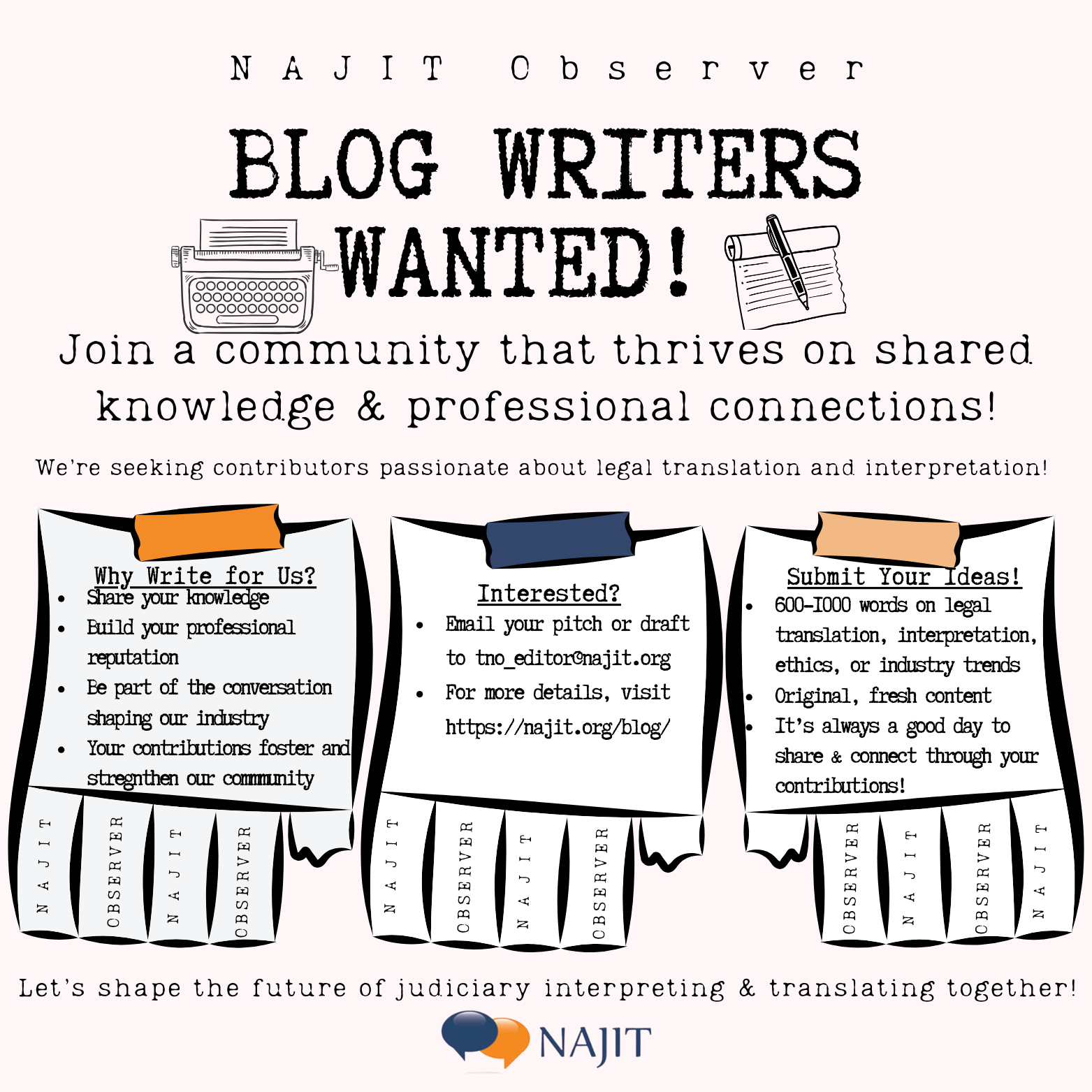
12 Dec Let’s Test Your Ethics: Public Record vs. Confidentiality
Let’s Test Your Ethics
The NAJIT Observer Team
Welcome to “Let’s Test Your Ethics”
As professional interpreters and translators, we often navigate challenging situations that test our ethical judgment. Whether it’s balancing confidentiality with transparency or maintaining impartiality in emotionally charged settings, these dilemmas are part of our work’s complexity.
This segment, “Let’s Test Your Ethics,” is designed to spark thoughtful discussion and provide a platform for our community to engage with hypothetical yet realistic scenarios. By exploring these challenges together, we can deepen our understanding of ethical principles and share insights that strengthen our collective professionalism.
Remember, there’s rarely a one-size-fits-all solution to ethical dilemmas. Your unique perspective, shaped by your experiences and values, is invaluable to this conversation.
Ethical Dilemma: Public Record vs. Confidentiality

Exploring ethical principles: A foundation for professional integrity in translation and interpretation
The Situation
You are translating documents for a public records request related to a controversial legal case. As you sift through the materials, you find sensitive information that was inadvertently included but should remain confidential. The agency has asked for a straightforward translation for public consumption.
As you consider your options, you realize the following:
- If you redact the sensitive information, the agency might accuse you of overstepping your role as a translator, which could harm your professional relationship and potentially lead to liability for not following instructions.
- If you translate the documents as instructed, you risk exposing private information that could harm individuals involved in the case or compromise the integrity of the legal process.
To complicate matters, the sensitive information includes personally identifiable details about a minor involved in the case, whose safety could be at risk if this information is made public.
Question:
Should you redact the confidential information before translating, adhering to ethical obligations but potentially facing repercussions from the agency, or do you translate the documents exactly as instructed, fulfilling your professional duty but risking harm to vulnerable individuals?
Reflect on This:
1. What would you do in this situation?
2. How do you weigh the agency’s instructions against your ethical duty to protect confidentiality?
3. What role do potential consequences, such as harm to the minor, play in your decision-making?
4. Would consulting with a supervisor or legal advisor help resolve the dilemma, or could that complicate things further?
Share Your Response
We’d love to hear your thoughts in the comments!
- How would you handle this ethical dilemma?
- Have you faced a similar situation?
- What principles guide your decision-making in scenarios like this?
Disclaimer
The scenarios presented in this series are fictional and intended solely for discussion and educational purposes within our professional community. They are not based on real events or specific cases but are designed to foster engagement and dialogue about ethical dilemmas that may arise in the field of judiciary interpretation and translation.
Thank you for reading!
The NAJIT Observer Team
Join the NAJIT Observer’s vibrant community of contributors! We are seeking passionate writers to share insights on legal translation and interpretation. Email your pitch or draft today and help shape our industry. Visit najit.org/blog for more details.



First of all I would inform the agency of the problem. Most likely the person handing out assignments is not
going to be checking those things, and may not know about confidentiality. And if the original document is in another language they won’t even know what it says. In my opinion the agency should then inform their client and request guidance. I certainly do not think that any translator should take it upon him or herself to redact anything and not say anything. An explanation of the possible harm to someone should be included when you inform the agency.
After that it is out of my hands. Now that the agency has been informed, it could re-insert the redacted info by other means if it really wanted to, even if I take it out, The decision of what to redact or not is the attorney’s, not mine. It is a legal matter in this case.
This sounds like a balanced solution.
Thank you for pointing that out! It’s true that this approach strikes a thoughtful balance between maintaining professional boundaries and upholding ethical responsibilities. It’s a reminder of how important it is to communicate clearly with agencies and advocate for ethical practices while staying within the translator’s role.
What are your thoughts on how translators can prepare themselves for situations like this? Are there steps we can take to ensure agencies and clients are more aware of these ethical challenges from the outset? We’d love to hear more ideas from you and others in the community!
Thank you!
NTO Team
Thank you for sharing your perspective! You’ve highlighted an important point about the role of the agency and the responsibility of the attorney in legal matters. Informing the agency and providing a clear explanation of the potential harm demonstrates both professionalism and a commitment to ethical practice.
Your suggestion to let the agency take the lead on redaction aligns with the idea of maintaining the translator’s role without overstepping boundaries. It also reinforces the importance of transparency and collaboration.
What are your thoughts on how we, as translators, can handle situations where the agency or client is unresponsive or insists on translation without redaction, even after being informed? Have you encountered situations like this before, and if so, how did you navigate them?
We’d love to hear more insights from you and others in the community!
Thank you!
NTO Team
For every translation job that I am accepting, I ALWAYS review the materials first before officially starting, to eliminate conflicts like this. Tight deadline will be out of the question too, because I can also work right away, but will definitely hold my work,
should a case of such dilemma occur. I might end up not getting paid for that, but I’ll take it as a business loss instead 🙂
For the case of the dilemna, I will definitely call the attention of the agency at once. If the agency insist on working on it, in spite of the personal identifiable information that will be exposed to the public eventually, that is when I will decline the job. The weight of the personal identifiable information, more so of a minor, being exposed at my expense, outweighs any job order for me. Redacting the information doesn’t guarantee that it’ll stay out along the way, hence it’s a NO as well.
Thank you for sharing your thoughtful process! It’s impressive how proactive you are in reviewing materials before accepting a job to prevent dilemmas like this. Your willingness to prioritize confidentiality, even at the cost of declining work, speaks volumes about your commitment to ethical practice.
You bring up an excellent point about how redacting sensitive information doesn’t necessarily guarantee its protection in the long term. Declining the job when the agency insists on proceeding is a bold decision, and it emphasizes the importance of protecting vulnerable individuals, especially minors.
What advice would you give to colleagues who might feel pressured to proceed with such assignments due to financial concerns or client relationships? And how do you think agencies could improve their processes to avoid putting translators in these tough ethical situations?
Looking forward to hearing more of your insights—and inviting others in the community to weigh in as well!
Thank you!
NTO Team